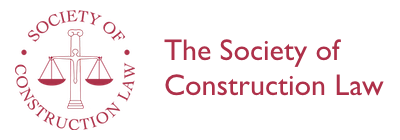The SCL Hudson Prize
This article explains the background to this annual prize.
Introduction
The Society of Construction Law is well-known to most of those involved in construction procurement, contract claims and dispute resolution. Founded in 1983, it comprises over 3000 members from all sections of the construction industry and associated legal practices. Lord Justice Coulson is its President and Rebecca Shorter is the current chair. Its mission is to promote and encourage the study of construction law and the exchange of information and ideas concerning it. This is done in a number of ways, including the giving of papers by invited speakers at the monthly meetings in London and the regions, publishing papers and supporting educational activities in the construction law field in universities and colleges.
The idea of an essay prize
In the mid-1980s, Leonard Fletcher and other leading members of the Society at that time conceived the idea of an annual prize to be given for the best essay on a construction law topic. The name was chosen in honour of Alfred Hudson, who was virtually the founding father of the subject and author of what was for many years the only comprehensive principal text. Thus the Alfred Hudson Prize, as it was then known, came into being.
The SCL Hudson Prize
After a decade as the Alfred Hudson Prize, the competition was re-launched with a slightly different format as the SCL Hudson Prize in 1996, in order to encourage the widest possible range of participants and topics. A maximum limit of 5000 words was introduced and the emphasis placed on originality of thought or approach. The Society has periodically increased the prize money, which currently stands at £4,000 for 1st Prize and £2,500 for 2nd Prize. Entrants can also be Highly Commended or Commended. All who are awarded prizes or commendations receive a year' free membership of the Society.
Topics for entry
The Society's Council set out an early formulation (since modified, see ‘Rules and guidelines’ below) of appropriate subject matter for entries as follows: 'The subject matter for entries for the SCL Hudson Prize shall be: A topic which is part of, or closely related to, construction law, including (but not restricted to) Construction and Engineering Contracts, Contract Administration, Claims, Arbitration and Dispute Resolution, Construction Litigation, The law of Torts, Company Law, Property Law, Taxation relating to construction and any other aspect of law or procedure relevant to the construction industry.'
This was an attempt to express the extent of the range of appropriate topics for entry. The scope has always been wide. In the last ten years, there have been prize-winning entries on liquidated damages, costs in adjudication, insurance, performance bonds, payment legislation, concurrent delay, privilege, EU procurement, defective premises, unforeseen ground conditions and variations.
Rules and guidelines can be found here.
Judging the entries
Because of the eclectic choice of topics submitted, it has been seen as important to have a judging panel with a variety of backgrounds. It is our policy to have both lawyers and non-lawyers as panel members. At different times, the panel has included barristers (both KCs and juniors), solicitors, arbitrators, engineers, chartered surveyors and academics.
As already indicated, the judging panel will give considerable weight to the freshness of the ideas and the value of the work: especially to originality of thought/approach and contribution to the study or practice of construction law or its application. Naturally, the substance of the submission is important and so explanation of the basic information and the quality of the discussion/analysis are at a premium. Marks are also awarded for clarity of presentation, grammar, spelling, punctuation and referencing.
A strict approach is taken to the 5,000 word limit. While footnoting or other methods of referencing sources do not count towards this total, and are encouraged, recent attempts to avoid the word limit by loading footnotes with matters of substance have almost always been counter-productive.
Papers with a maximum of two authors will be accepted, although any prize obtained in this way would be shared between the authors.
Entrants and winners
Just as the Society's members represent many disciplines related to construction, so the entrants and winners of the SCL Hudson Prize have come from a wide range of backgrounds. Unsurprisingly, the legal profession is well represented, with three pupil barristers and a Queen's Counsel amongst past prize-winners. Solicitors, including a trainee solicitor, have been numerically the most successful grouping, with two prizes for local authority solicitors since 2008 to add to those won by private practitioners, both associates and partners.
Although Philip Britton, with four First Prizes and a Second Prize, has been the most successful competitor in the history of the SCL Hudson Prize, academics have been less dominant than might have been expected, with seven wins (four Firsts, three Seconds) since 1996. Quantity surveyors have won two major Prizes.
Reflecting the geographical spread of SCL membership, there have been a number of wins from outside London, including from Scotland, Northern Ireland, Hong Kong and most notably from Australia. Australian-based entrants have won five major Prizes (one First, four Seconds) and Australians based in the UK a further three Prizes, Julian Bailey being only the second-ever competitor to win First Prize on two occasions.
Past winners
A list of past winners can be viewed on this website.
Publication of winning papers
The Society publishes the prize-winning entries and many have also been published in prestigious journals such as the International Construction Law Review and the Construction Law Journal.
